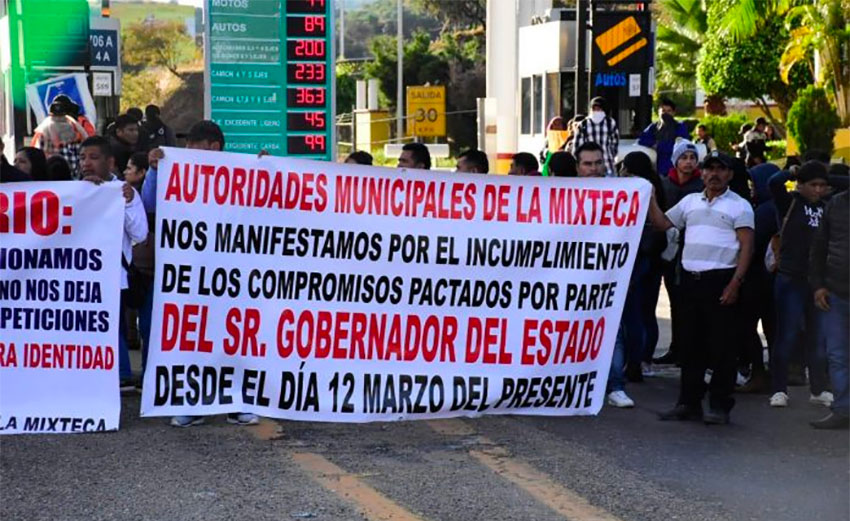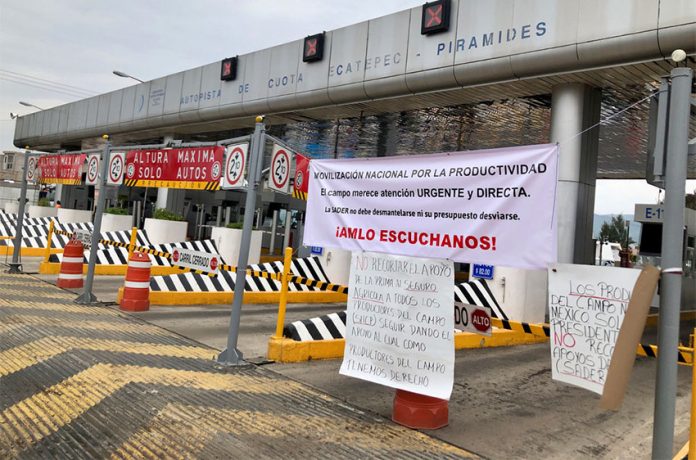Hijacking highway toll plazas continues to be a lucrative activity in many parts of Mexico even as the federal government takes action to address the problem.
Protesters, the unemployed and even mayors took over at least 18 toll plazas across the country on Monday just one day after the National Guard cleared eight in Nayarit.
Plazas in Mexico City, Morelos, Baja California, Guerrero, México state, Oaxaca, Querétaro, Guanajuato, Sonora, Puebla and Hidalgo were occupied, according to a report by the newspaper Reforma.
In Mexico City, protesters took over toll plazas at the entrance to the highways to Querétaro; Texcoco, México state; and Cuernavaca, Morelos.
Those occupying the toll plaza on the route to the Morelos capital have set up camp, seemingly indicating that they plan to settle in for the long haul and collect “voluntary contributions” from motorists around the clock.
In México state, many of the people occupying toll plazas are unemployed and looking for a way to get by at a time when jobs are scarce due to the coronavirus pandemic.
According to the newspaper El Universal, the toll plaza on the Mexico City-Querétaro highway at Tepotzotlán and that on the Circuito Exterior Mexiquense (México State Outer Loop Road) at Tultitlán are regularly occupied by groups of unemployed people who ask motorists for contributions lower than the regular toll.
A toll booth worker at Tultitlán said that groups of unemployed people take over one, two or all of the lanes at the toll plaza every day of the week. She said that they justify their actions by saying that they lost their jobs due to the coronavirus.
Out of work ride operators, waiters and drivers who work in the tourism sector are among those who regularly show up at the toll plaza in Tultitlán, located about 70 kilometers north of Mexico City.
A violent group known as “Revolutionary Movement of Ecatepec” and another called “Pacific Civil Disobedience” have also taken over the toll plaza, El Universal said, explaining that up to 70 people arrive there in pickup trucks before getting to work collecting tolls. Groups normally only stay for 20 to 30 minutes and flee when they catch wind that the National Guard is on its way.
Jobless people have also occupied toll plazas in Morelos. Unemployed people and students took over a toll plaza on the Mexico City-Acapulco highway, the Autopista del Sol, over the weekend and charged motorists a “voluntary contribution” of 50 pesos.

According to the newspaper El Sol de Cuernavaca, the occupiers of the Ahuehuetzingo toll plaza didn’t hold up any signs to explain the motivation for their actions. When one motorist refused to pay, the toll plaza hijackers surrounded his car and aggressively demanded that he cooperate.
One motorist told El Sol that the toll plaza occupiers are sent there by a group intent on cashing in on prevailing lawlessness.
Community landowners in Morelos have occupied another toll plaza on the Autopista del Sol in recent days to demand that the federal government and a highway concessionaire comply with commitments to clean up a waterway near the highway and complete the construction of a community building on their property.
Toll plazas in other parts of the country, including Nayarit, have been occupied by farmers who say that they and/or their land have been adversely affected by the construction and operation of highways.
In Oaxaca on Monday, officials from municipalities in the state’s Mixteca region decided that taking over a toll plaza would be a good strategy to pressure the state government to deliver resources to them.
Led by mayors, Mixteca region officials occupied a plaza on the Oaxaca-Puebla highway in the municipality of San Pueblo Huitzo, located about 40 kilometers north of Oaxaca city. The officials demanded that the state government release resources earmarked for spending on security, including the purchase of police vehicles.
They held up a large sign demanding that the Oaxaca Ministry of Finance comply with its funding commitments and treat the Mixteca region people fairly. Unlike other toll plaza occupiers, the officials weren’t collecting contributions from motorists before letting them pass.
Instead they simply blocked the toll plaza, causing long lines of traffic to accumulate. Motorists were eventually able to pass when the mayors and other officials took their protest to government offices in the state capital.
In addition to the takeover of at least 18 toll plazas on Monday, protesters blocked highways in Sonora, México state, Guerrero and Oaxaca for a range of reasons.
Enrique González, president of the National Chamber of Trucking, said that highway blockades and toll plaza takeovers cause significant losses for the industry.
He explained that truck drivers are charged twice at occupied toll plazas because they are forced to pay tolls to the hijackers after which their electronic toll tags are detected.
If the drivers refuse to pay the occupiers, their trucks are scratched or otherwise damaged, González said.
The occupation of toll plazas has caused the loss of more than 3 billion pesos (US $134.1 million) in toll revenue this year, according to Marco Antonio Frías Galván, head of the Association of Road Infrastructure Concessionaires.
He said last week that the association he leads is working with the federal Security Ministry to develop a plan to prevent the takeover of plazas. President López Obrador has claimed that the federal government is putting an end to the practice and that it has avoided losses of up to 7 billion pesos.
But Frías contended that impunity remains a significant incentive for would-be occupiers, who can reportedly collect up to 1 million pesos (about US $45,000) per day at a single toll plaza.
“While there’s no punishment for those who take over toll booths, … the incentive will remain. It’s also clear that this very impunity has led to the creation of groups that exclusively dedicate themselves to blocking [toll plazas]. They’ve found a significant source of illegal revenue,” he said.
Source: Reforma (sp), El Universal (sp), El Sol de Cuernavaca (sp)
